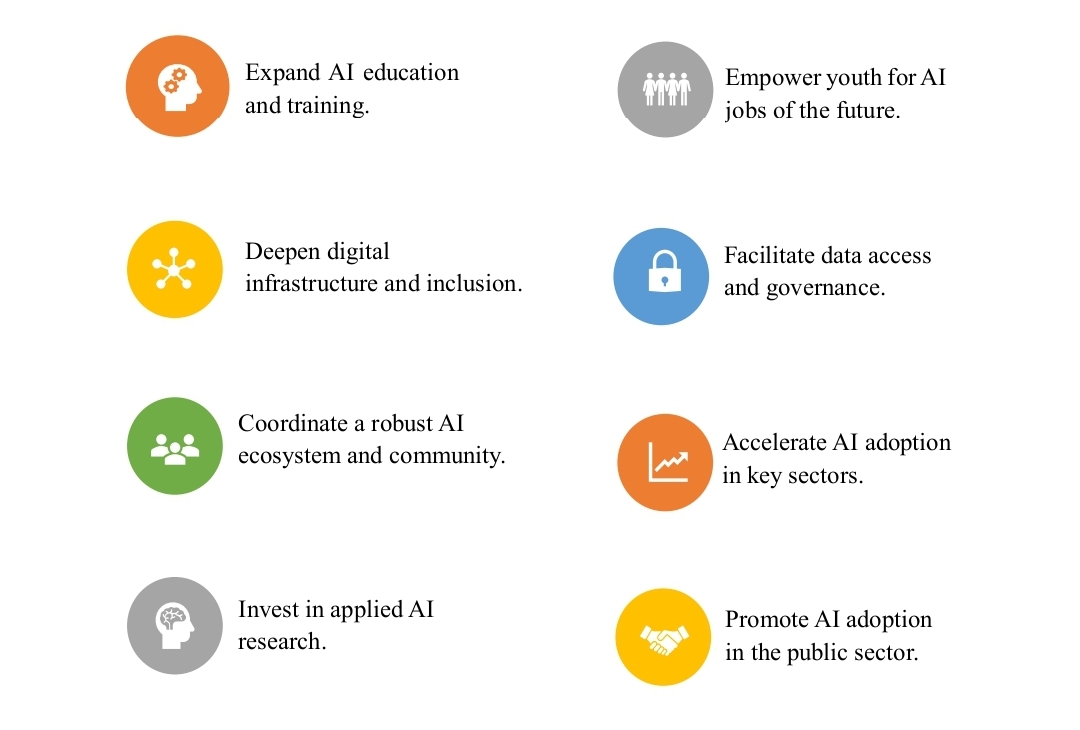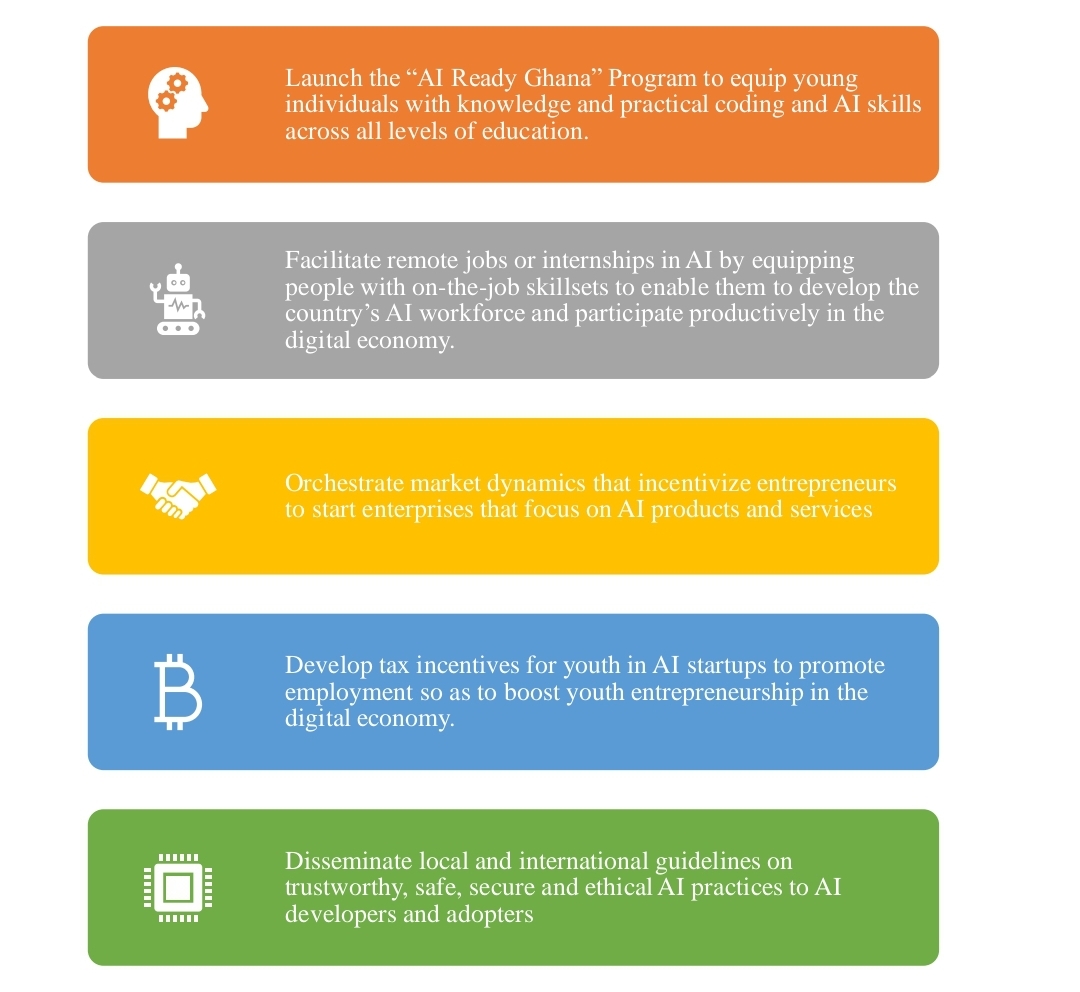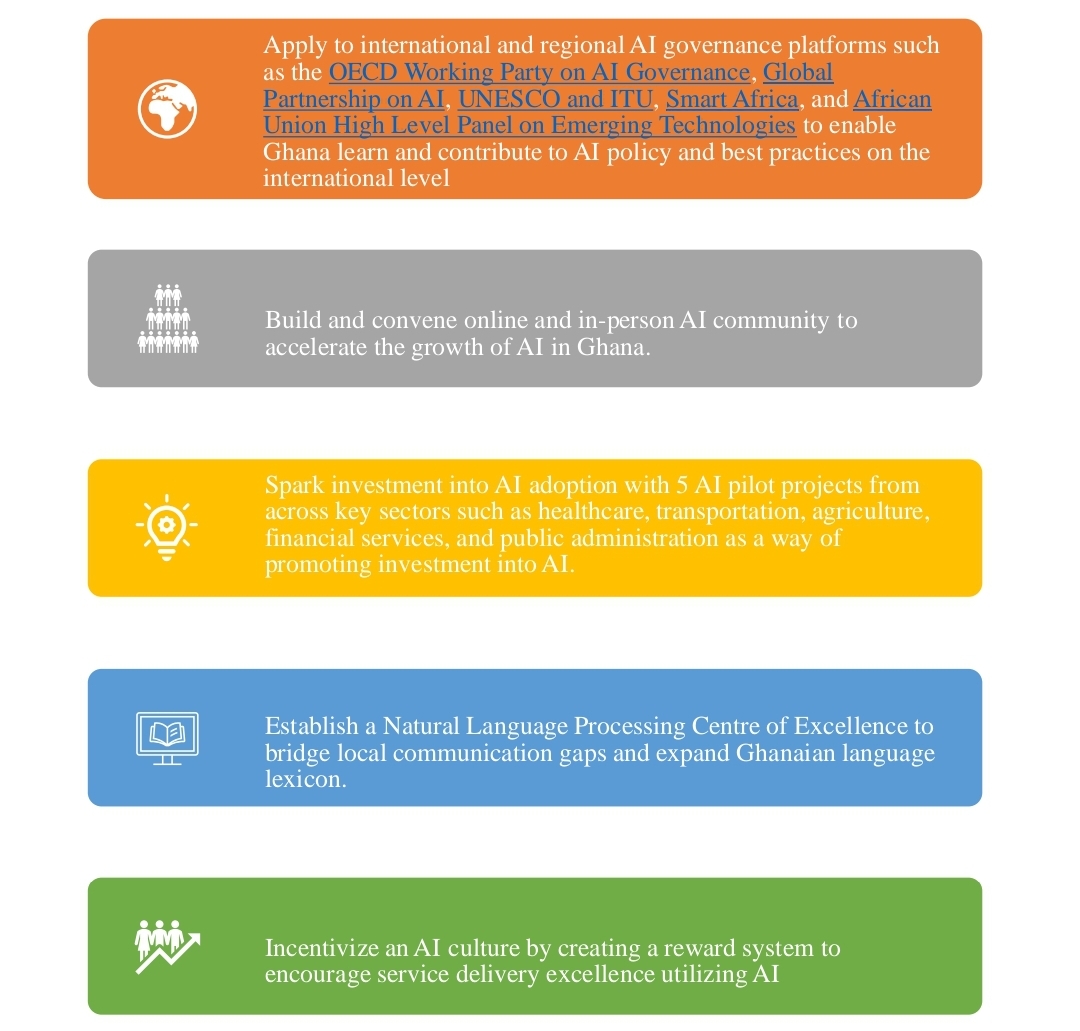Special topics
“In many cases, jobs that used to be done by people are going to be able to be done through automation (AI). That’s one of the more perplexing problems of society.” —John Sculley, former CEO of Apple.
Across the world, governments are taking cognizance of the impact of AI – its transformative potential, prominent multi-sectoral applications, ethical risks, and regulatory concerns – and have begun taking policy measures to ensure a responsible and sustainable use of AI. Key evidence of this is the growing number of national AI strategies which have been developed since 2017 in various regions of the world. On the African continent, although many countries have some AI policy measures in place, Sub-Saharan Africa in particular is however reported as the region with the lowest average score on the Government AI Readiness Index 2023 by Oxford Insights. This signifies the challenges Sub-Saharan Africa is facing in terms of harnessing AI, as only Mauritius, Ghana, Rwanda, Senegal, and Benin have adopted national AI strategies as of 2023.
Undoubtedly, these national AI strategies are critical steps towards setting the policy direction, priorities, and frameworks for AI adoption, use and regulation in national contexts. Against this background, this publication sheds light on Ghana’s National Artificial Intelligence Strategy.
Ghana’s National Artificial Intelligence Strategy was developed in 2022 by the Government of Ghana through the Ministry of Communication and Digitalisation with support from Smart Africa, GIZ FAIR Forward, The Future Society and some stakeholders in Ghana’s AI ecosystem. The strategy envisions that, “By 2033, people living in Ghana will experience a transformed society where AI advances the potential of people, government, businesses, and systems to achieve inclusive social and economic transformation and quality of life. Ghanaians would have the capabilities and enabling environment to be competitive in the global digital economy, positioning Ghana as an African AI hub.”
With a decade span from 2023-2033, the intent of the strategy is to serve as a comprehensive roadmap for harnessing the potential of AI’s application to accelerate the country’s inclusive and
sustainable socioeconomic development, and to also mitigate the risks that come with AI adoption and use.
Content wise, Ghana’s AI strategy has 8 pillars and 31 corresponding key policy recommendations, 7 target sectors, an action plan, and a responsible office for the implementation of the strategy. The strategy document also presents a diagnostic assessment of Ghana’s AI ecosystem which identified opportunities and constraints as well as existing concrete cases of AI applications in some sectors in the country.

Deepen digital
infrastructure and inclusion.
Facilitate data access and governance.
Coordinate a robust AI
ecosystem and community. Accelerate AI adoption in key sectors.
Invest in applied AI research.
Promote AI adoption in the public sector.
In all, there are 31 key policy recommendations outlined in the Strategy and aligned to the 8 pillars stated above. Some of these are highlighted as follows:


Under the Strategy, recognition, promotion, and awards will be given to individuals and organisations that leverage AI to enhance public service delivery as way of promoting an AI innovation culture.
Ghana’s AI Strategy targets the following sectors:
Healthcare Agriculture Transportation
Energy
Financial Services
Lands and Natural Resources
Environment and Circular Economy.
In the area of education, AI adoption has the prospect of providing students and teachers with tools and technologies that can effectively facilitate personalized learning, enhanced research and assessment. AI tools and technologies are therefore likely to be integrated into or will complement the existing E-Learning platforms of most educational institutions in Ghana to deliver an enhanced interactive learning experience and improve educational outcomes. The deliberate orientation of students on AI tools and technologies as recommended by the Strategy can also foster the acquisition of responsible AI and digital skills among the youth which they can apply to solve societal problems and therefore create both social and economic value.
These foreseen successes notwithstanding, AI tools can negatively impact academic life as they have the potential to drive plagiarism and encourage laziness among students. In the information and communication landscape which is related to education, there are dangers of AI tools being manipulated to cause a surge in mis/disinformation in the country. The implementation of the
Strategy also risks widening the digital divide if deliberate efforts are not made to bridge the gap in access to digital technology in underserved educational contexts in Ghana.
The health sector is another area in which the Strategy is expected to impact the lives of Ghanaians. Already, medical supplies are being delivered to health centres in rural areas using drones by Zipline and thus serving the health needs of ordinary people. The Strategy may therefore trigger authorities and practitioners in the Ghana Health Service to integrate AI tools and technologies in the implementation of Ghana’s digital health policy. This could possibly reflect in the development of AI-powered digital health infrastructure and interoperability systems, for instance, the generation and integration of electronic medical files of patients into single digital health records accessible for timely use by authorized healthcare facilities and medical practitioners in different parts of the country to improve healthcare delivery.
Although they can be leveraged for disease surveillance, detection and response, there is the danger of the unethical use and abuse of AI tools and technologies by medical practitioners and individuals alike that can negatively impact lives in the country sooner than later. The risk of AI failures and inaccuracies with respect to appreciating local contexts and personal feelings could therefore lead to a surge in wrong medical diagnoses and prescription in the country and take a negative toll on the health of patients including possible resultant deaths.
In terms of agriculture, the Strategy is likely to impact food security in Ghana. It can propel the integration of AI tools and technologies to optimize irrigation to increase food production as well as enhance the storage and preservation of food produce. This would ensure that there is all-year- round farming which can boost the availability of food in high supply to meet the raw material demands of food processing industries and the nutritional needs of Ghanaians. This could also reduce the phenomenon of post-harvest losses and increase the incomes of farmers. If government does not provide incentives that are equitable and inclusive enough, smallholder farmers in rural areas who might not be able to invest in such AI-powered agricultural technologies and infrastructure risk being left behind in tapping into the associated potential benefits.
As observed in the Strategy, there is an emphasis on providing tax incentives to businesses especially startups which integrate and mainstream AI tools and technologies into their operations to expand Ghana’s digital economy. If industries and businesses in Ghana’s emerging digital and e-commerce ecosystem can therefore position themselves well to leverage the policy through the strategic adoption of AI, employment opportunities can be created especially for the teeming youth in Ghana. Also, industrial processes and business operations can be automated, streamlined and optimized to improve production, value-addition and supply chain management as well as customer service relations which can increase the efficiency and profitability of commercial ventures in Ghana and foster wealth creation.
While the Strategy can trigger the scaling up of innovation and employment in the e-commerce and start-up ecosystem in Ghana, if awareness about opportunities and value of AI adoption and digital skills gaps are not well addressed, competition in terms of innovation could throw some businesses out of operations. Potential job losses and unemployment also lurk. These could therefore negatively impact people and businesses.
It has been about 17 months since the National Artificial Intelligence Strategy of Ghana was delivered in October 2022 with reports suggesting that it is still pending Cabinet approval. In the meantime, the following issues have emerged and require attention:
In conclusion, there is no gainsaying that citizens’ awareness levels are low with respect to the newly developed National Artificial Intelligence Strategy of Ghana. Although this article highlighted snippets of the Strategy, efforts must be expedited by the Ministry of Communication and Digitalisation and other responsible government agencies to balance policy communication and implementation to drive the overall uptake and execution of the Strategy even as regulatory and ethical guidelines are firmed up, disseminated, and enforced for responsible adoption and use of AI in Ghana to the benefit of all.